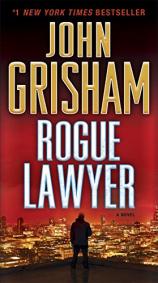Rogue Lawyer
Review
Rogue Lawyer
ROGUE LAWYER is John Grisham’s Howard Beale moment. Beale was the television news anchorman in Paddy Chayefsky’s 1976 dark comedy, Network. After being informed by station executives that his low television ratings made his dismissal inevitable, Beale arrives at the live broadcast of his show and pours out his anguish over the declining state of broadcast journalism. He instructs his audience to go to their windows, open them up and scream, “I’m mad as hell, and I’m not going to take this anymore!”
Many bestselling writers appear to be willing to avoid taking controversial stands on contemporary social issues. However, Grisham seems to relish attacking the perceived ills of society as the basis for many of his legal-themed novels. Through decades of bestsellers, he has attacked the death penalty, unethical lawyers, the vice of money in judicial campaigns and numerous other problems of the American justice system. In his latest effort, he has ratcheted up his displeasure to a new level --- this time, he takes on steroids. For Grisham, justice is no longer an element of American criminal law.
"You can certainly read ROGUE LAWYER as an entertaining legal thriller, but in fairness you should ponder the important questions it asks about America’s criminal justice system. John Grisham would expect nothing less."
Attorney Sebastian Rudd is the lens through which readers will examine the criminal justice system, and it will not be a complimentary portrait. Rudd is a unique character, a solo practitioner who does not even have a law office. His vehicle, a large Ford cargo van, serves as his office, which past events justifies. Rudd has a legion of enemies, both former clients and police officers who have seen their professional lives heavily damaged by his “take-no-prisoners” approach to trials. He has avoided a permanent office ever since his last one was fire-bombed by an arsonist who was never apprehended. His legal team primarily consists of his driver/bodyguard, Partner, who Rudd describes as his only friend. Their bond was sealed when Partner, represented by Rudd, was found not guilty of the murder of an undercover narcotics officer. Like Humphrey Bogart and Claude Rains in Casablanca, it was the beginning of a beautiful friendship.
Grisham has multiple targets in his criticism of the criminal justice process. He has chosen to present his case using an episodic format; the result is a series of short novellas with Rudd’s battles with police, prosecutors and judges being the overarching theme binding them together.
In the first such episode, readers are introduced to Rudd as he defends his client against a capital murder charge. The crime, which involved the murder of two young girls, was heinous and brutal. The public is outraged, and the media frenzy is enormous. There’s just one problem: Rudd’s client is innocent. For years, Grisham has been a vocal opponent of the death penalty, writing and speaking of its tragic shortcomings. The number of death penalty cases where convicted defendants are actually innocent is astoundingly large. Why? Grisham makes it very clear: “If a prosecutor gets caught cheating, he either gets reelected or elevated to the bench. Our system never holds a bad prosecutor accountable.” As Rudd struggles to prove his client’s innocence, we learn an important fact. Rudd has no qualms about fighting as dirty and unfairly as circumstances warrant. The only way to fight evil is with equal amounts of evil.
The second case focuses on the militarization of police departments across America. Doug Renfro, an average suburban homeowner, is awakened one night to the sound of intruders. He grabs for his gun, and shots are exchanged. The result? Renfro is seriously wounded, and his wife is killed. The intruders are the local police department’s SWAT team, invading Renfro’s home because they believe he is involved in the illegal sale of prescription drugs. They are wrong, incredibly wrong, but double down and charge Renfro under a state law that does not allow a citizen to fire at police officers even if the officers improperly invade his or her home. As Grisham describes this case, his anger jumps off the pages. Why didn’t the police just ring the doorbell during the day and ask some questions? “The answer is simple: These guys think they are part of an extreme elite force, and they need their thrills…”
There are further examples of injustice in the remaining chapters. This is an angry and perplexing book that raises numerous questions while leaving just as many unanswered. Sebastian Rudd is a fighter for justice, but to achieve a just result, he often resorts to injustice and illegality of his own. You can certainly read ROGUE LAWYER as an entertaining legal thriller, but in fairness you should ponder the important questions it asks about America’s criminal justice system. John Grisham would expect nothing less.
Reviewed by Stuart Shiffman on October 22, 2015





